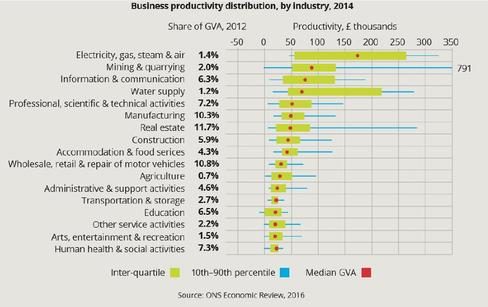
Productivity continues to stagnate in the United Kingdom, the issue has never been so high profile in the main stream media, yet we have yet to see the breakthrough. The question is therefore are we any closer to a breakthrough that will drive growth?
We are told admitting we have a problem is always an important first step and that has clearly been accepted across government, the media and by main in business. And yet many businesses are addicted to cheap and flexible labour while neglecting the need to invest in digital technology, automation, data capture and artificial intelligence. This is not to even mention the investment in their workforce’s skills, wellbeing and feedback. With 66% of business still below the productivity average in the UK there is much to do. So, are there any practical steps available?
The Chancellor of the Exchequer will deliver his budget in Autumn 2017, much has been speculated on that could create energy and growth in the economy, keep tacking down on corporation tax, borrow for infrastructure, house building boom and the list grows. Yet year after year one very simple and obvious measure gets overlooked, capital allowances.
Capital allowances drive a positive behaviour, they work by requiring business to do what is needed – invest in capital – to see a benefit – reduced tax spend. For those sectors not capital investment driven this may be hard to swallow, the sectors that will really drive productivity and GDP will however have a real incentive to kick start growth and then other levers can be brought into play. Making it attractive to invest must be a priority.
Further work to grow knowledge in R&D tax credits is another vital item area where government can make a positive impact. Too few SME’s are using these to support their business growth and innovate. Business cannot moan about lack of support when the take up for R&D tax credits or Patent Box are still well below their potential.
Support to the regions, engaging the devolved nations positively is now more vital than ever. Northern Ireland needs a functioning Executive and Westminster must be genuine about supporting the entire UK and not just London / South East. A strong Northern Powerhouse, a vibrant Midlands Engine as well as 3 devolved nations must be supported and harnessed for success.
So, government has within its grasp the ability to help create a more conducive environment for productivity to flourish. These changes, though apparently small and certainly not headline grabbing will create behaviours, especially within the SME businesses. Management will think about investing in the business rather than risk averse cash preservation. Projects to introduce new processes, services and products will be viewed not as costs or significant challenges but further means to gain a return on investment. Behaviours that will drive productivity, wage growth and economic strength.
We are told admitting we have a problem is always an important first step and that has clearly been accepted across government, the media and by main in business. And yet many businesses are addicted to cheap and flexible labour while neglecting the need to invest in digital technology, automation, data capture and artificial intelligence. This is not to even mention the investment in their workforce’s skills, wellbeing and feedback. With 66% of business still below the productivity average in the UK there is much to do. So, are there any practical steps available?
The Chancellor of the Exchequer will deliver his budget in Autumn 2017, much has been speculated on that could create energy and growth in the economy, keep tacking down on corporation tax, borrow for infrastructure, house building boom and the list grows. Yet year after year one very simple and obvious measure gets overlooked, capital allowances.
Capital allowances drive a positive behaviour, they work by requiring business to do what is needed – invest in capital – to see a benefit – reduced tax spend. For those sectors not capital investment driven this may be hard to swallow, the sectors that will really drive productivity and GDP will however have a real incentive to kick start growth and then other levers can be brought into play. Making it attractive to invest must be a priority.
Further work to grow knowledge in R&D tax credits is another vital item area where government can make a positive impact. Too few SME’s are using these to support their business growth and innovate. Business cannot moan about lack of support when the take up for R&D tax credits or Patent Box are still well below their potential.
Support to the regions, engaging the devolved nations positively is now more vital than ever. Northern Ireland needs a functioning Executive and Westminster must be genuine about supporting the entire UK and not just London / South East. A strong Northern Powerhouse, a vibrant Midlands Engine as well as 3 devolved nations must be supported and harnessed for success.
So, government has within its grasp the ability to help create a more conducive environment for productivity to flourish. These changes, though apparently small and certainly not headline grabbing will create behaviours, especially within the SME businesses. Management will think about investing in the business rather than risk averse cash preservation. Projects to introduce new processes, services and products will be viewed not as costs or significant challenges but further means to gain a return on investment. Behaviours that will drive productivity, wage growth and economic strength.

 RSS Feed
RSS Feed
